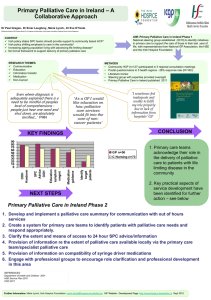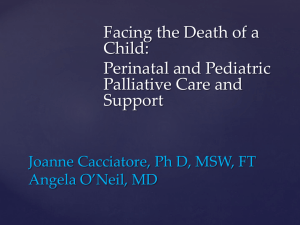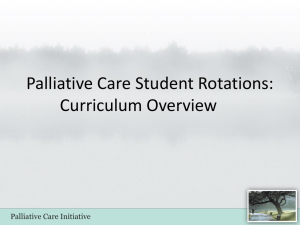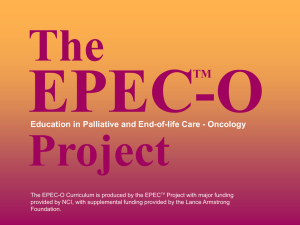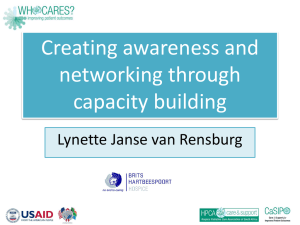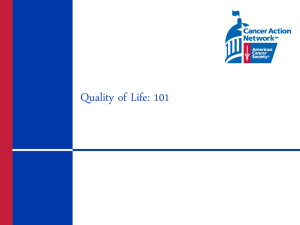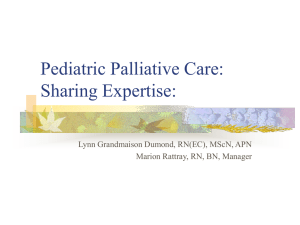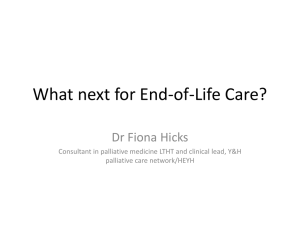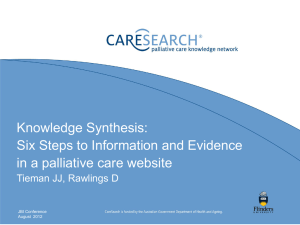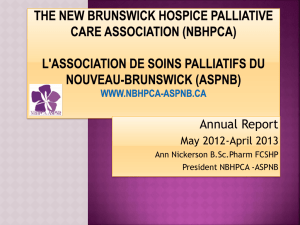Cancer and Palliative Care Competencies
advertisement
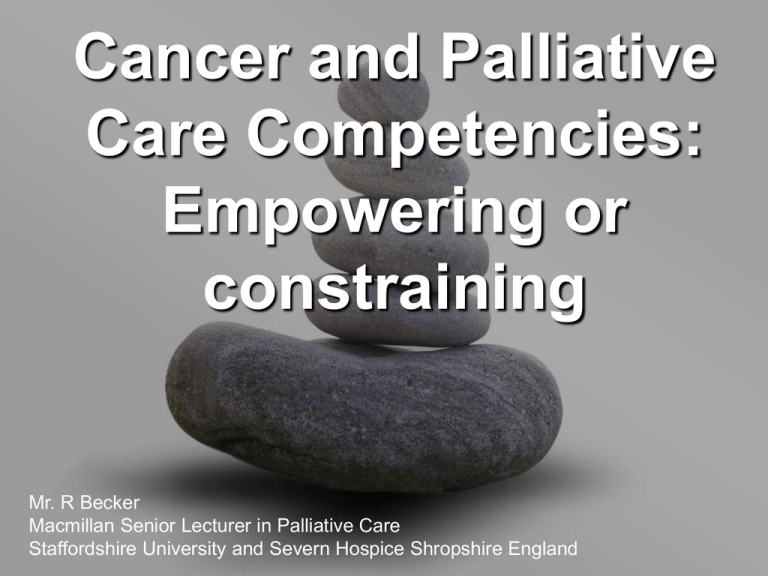
Cancer and Palliative Care Competencies: Empowering or constraining Mr. R Becker Macmillan Senior Lecturer in Palliative Care Staffordshire University and Severn Hospice Shropshire England “Eighty percent of success in life is related to attitude rather than competency” Anon Competencies can be seen as… • A universal panacea which will revolutionise skills based training and education • The Emperors new clothes What is competency? “The skills, knowledge, experience, attributes and behaviours required by an individual in order to perform the job effectively” (RCN 2002) The core skills of palliative care nursing 1. Communication skills 2. Psychosocial skills 3. Team skills 4. Physical care skills 5. Life closure skills 6. Intrapersonal skills Becker R (2000) Competency Assessment in Palliative Nursing . European Journal of Palliative Care. Vol 7. No 3. Pages 88 – 91. A comparative view of the skills development of district nurses using a competency assessment tool COMMUNICATION SKILLS 100 80 Explored 60 Practiced 40 Developed Mastered 20 0 Baseline Final Designing a competency statement The core components: • Knowledge • Skill • Behaviour/attitude Examples include: • K - Discuss the concept of total pain and it’s relevance to patient centred care in a palliative context • S - Conduct a pain assessment interview using a range of available frameworks and tools • B/A - Demonstrate and articulate an active commitment to the holistic assessment of pain Complex statements that involve reflection and professional maturity • Demonstrate respect for the inherent worth of others, coupled with a predisposition to look for the good things in people, and an intrinsic belief in this • Recognise and attempt to understand your own reactions and feelings when caring for the dying and bereaved, reflecting on how this affects the care given in sensitive situations I now see myself more as my peers see me, some of this I like and some of this I was surprised about. I know I am judgemental and I have been working with someone who isn’t, to try and improve and learn By focusing on how competent others see you it gives you another perspective on your own abilities. Honesty is everything. I was told that I was not as good at listening as I thought. I was afraid of silence and I needed to practice this more. I never realised. Becker R (2000) Competency Assessment in Palliative Nursing . European Journal of Palliative Care. Vol 7. No 3. Pages 88 – 91. KNOWLEDGE COMPETENCE COGNITIVE/ANALYTICAL COMPETENCE TECHNICAL PSYCHOMOTOR COMPETENCE PERSONAL ETHICAL, BEHAVIOURAL COMPETENCE AFFECTIVE COMPETENCE INTRAPERSONAL COMPETENCE Becker R (2007) Ch 2, The use of Competencies in Cancer and Palliative Education, in Foyle L & Hostad J (2007) Innovations in Cancer and Palliative Care Education, Radcliffe Press Integrating Competencies? • USA – Robert Wood Johnson Foundation (Ferrell et al 1999) • Medical Education . (Pall Med Curric 1992) • Nursing ? Ad hoc (Lloyd Williams & Field 2002) • Allied Health Professionals ? Ad hoc (Becker 2007) The Notion of Competency Assessment “There is a climate of uncertainty amongst nurses, who are confused and overwhelmed by the proliferation of methodologies presented to them, which are often written in educational language that they are unfamiliar with.” Becker R (2000) Competency Assessment in Palliative Nursing. European Journal of Palliative Care. 7. (3) p88-91. The way forward? Universities, Educators and professional bodies: • Identify appropriate modes for education delivery • Education and training commissioning with local providers • Facilitate competency acquisition in the workplace –work based learning • Provide uniform, clinically relevant and standardised content for cancer and palliative care education programmes. Individual practitioners: • Plan and develop their career pathway. • Identify their own training and education/skill requirements. • Access appropriate education initiatives • Self-assess performance in relation to Individual Performance Review (IPR) and the development of a Personal Development Plans (PDP). Managers: • Assessing ongoing competency as part of the IPR process. • Informing future roles and responsibilities, job description and person specification development (DOH 2005) • Measuring competency within a team to inform skill mix review and staffing establishment. • Identify workforce training needs. • Monitor progress for achieving national targets and standards. ...”When we speak of challenges we must not forget that of teaching and enthusing our professional colleagues and students. I suspect we have got it wrong. We are filling the syllabus with doses and data when we should be trying to change attitudes. Wherever I travel in the world I find palliative care workers who feel they must justify their existence, particularly if they have specialist status, and they do so by parading facts and figures rather than sharing some of the profound insights which so characterise palliative care….. Derek Doyle 1999 Farewell Address. Geneva. Thank you for listening Mr. R Becker Macmillan Senior Lecturer in Palliative Care Staffordshire University and Severn Hospice, Shropshire, England E mail: bobb@severnhospice.org.uk
